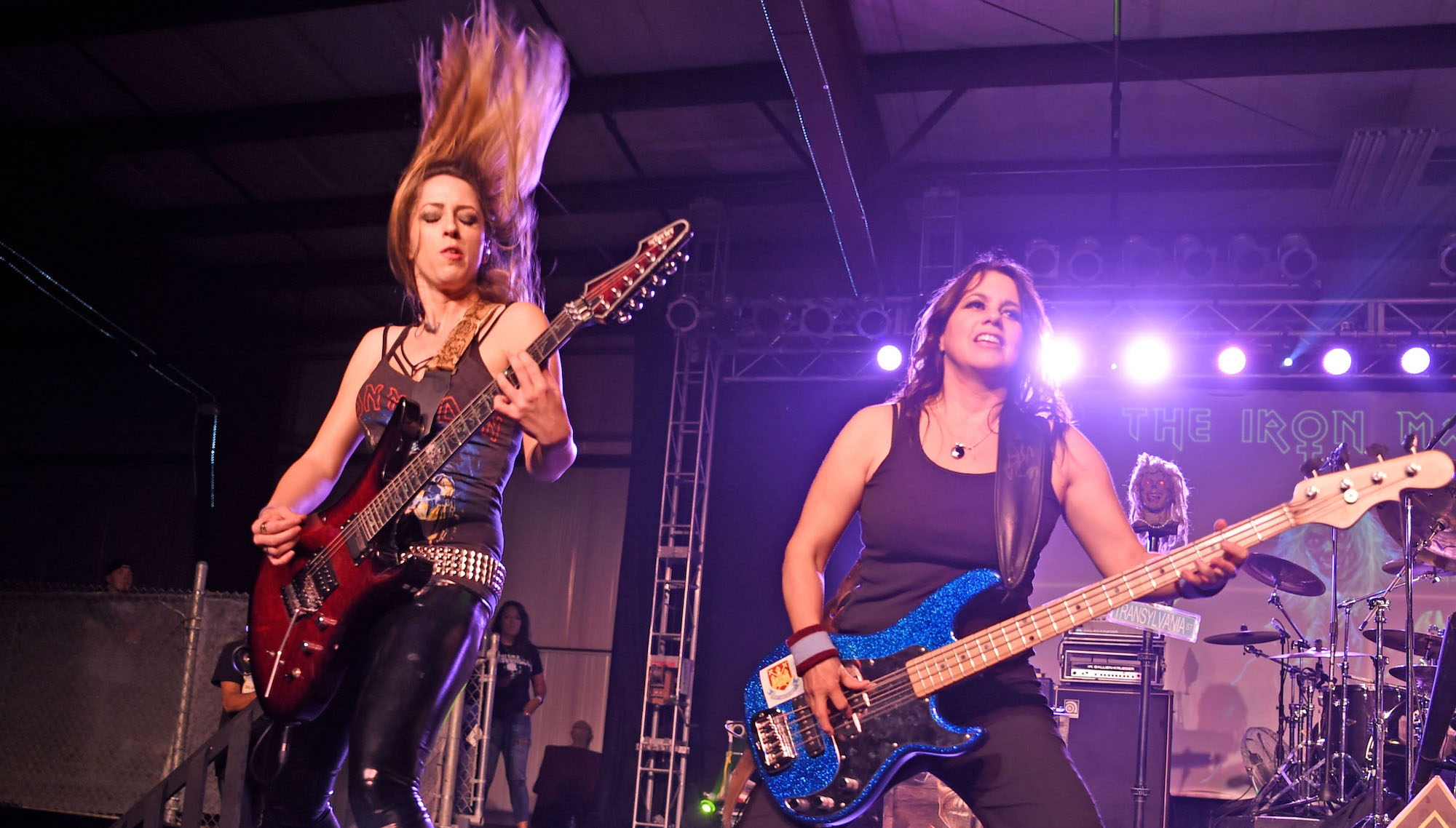“So many people don't understand how, as a lead player, I could idolize someone like Kurt Cobain, but for me, it's also about the songwriting and passion”: Nikki Stringfield has more up her sleeve than glorious shredding with the Iron Maidens
Fresh off the release of her solo debut, Apocrypha, the Schecter signature artist dishes on her love of the Kemper Profiler, the first Iron Maiden riff she learned, and the lasting impact of grunge on her guitar approach

As a longtime member of the Iron Maidens, 33-year-old Nikki Stringfield has been around the block, and most would assume she's primarily indebted to the '80s beasts she tames. But, with an equally strong love for all things grunge and fuzzy, Stringfield is eager to peel back the layer of her nightly shredding pyrotechnics and reveal her stellar riff-crafting skills.
“I have such a wide variety of influences, and I think it all comes out one way,” Stringfield tells Guitar World. “I was born in 1990, so I grew up with both '80s metal and grunge simultaneously and loved them both.
“I enjoy incorporating haunting vocal harmonies like Alice in Chains,” she continues, “along with the catchiness of Nirvana's hooks and riffs – and then, the dueling and flashy solos from the '80s.”
Grunge influences aside, one of the more exciting things about Stringfield is the duality in her licks. Though she grew up in Texas and always loved Stevie Ray Vaughan and Billy Gibbons, she “never really dove into the blues,” though it is something the metal-leaning shredder would “like to do when the dust settles.”
That's not to say, though, that Stringfield's recently-released debut solo record, Apocrypha, finds her straying entirely from '80s metal. Indeed, there are plenty of nods to the guitarist's most prominent, and perhaps obvious, influences.
“I love grunge, but as far as '80s metal, I'd have to say my biggest influences would be [Iron Maiden's] Dave Murray and Adrian Smith.”
“I've been playing their material with the Iron Maidens for the past 11 years,” she says. “Their harmonies, dueling solos, galloping rhythms... it's all so iconic, and it never gets old! I just saw them live at the Power Trip Festival, and they still sound as amazing as ever.”
Get The Pick Newsletter
All the latest guitar news, interviews, lessons, reviews, deals and more, direct to your inbox!
Though she's been around for over a decade, in many ways, it feels as if Nikki Stringfield's journey has just begun. Firmly establishing herself within the metal scene is one thing, but dropping a debut featuring plenty of personal influences is another.
The best, however, is yet to come – not the least of which is an impending guest slot alongside Mötley Crüe's John 5 in 2024.
“I'm so ecstatic to be opening for John 5 in Las Vegas in January,” Stringfield beams. “I was contacted by his booking agency asking if I'd be interested in opening, and of course I said yes. He's one of the most incredible players I've ever seen.”
Guest slots aside, Stringfield keeps plenty busy otherwise – always with an eye toward the future, which seems brighter than ever.
“My love for music inspires me. When I first moved to Los Angeles in 2012 and started playing in bands, I didn't know anyone, and I had just started playing live shows. I was in an original band and had started playing with the Iron Maidens then, and I was just happy to be on stage and performing.
“However,” she concludes, “finally playing my own music live has to be the best feeling I've ever had on stage, and I'm looking forward to continuing this journey.”

You've just released Where the Demons Lie. Tell us how you've gotten to this point in your career.
“It's been a combination of a lot of things. I think that Where the Demons Lie shows that in the vocals and main riffs. However, when you get to the solo, it's more melodic and harmonized. I've always loved '80s metal and anything with a memorable guitar solo. My music is a huge mixture of everything that I love.”
That track covers some heavy topics. Are those close to home?
“Most of Apocrypha was written during the pandemic when we were stuck at home and had no idea what the future would bring, so the lyrics have a darker side. The music for Where the Demons Lie was written entirely in a few hours, and I had to go back and add the lyrics afterward. They can speak to anything from a toxic person in your life to addiction. I'm a huge horror movie fan, which also has a significant play on my lyrics and imagery.”
I picked up a Nirvana tab book when I was 14 and learned all the songs, and that's how I taught myself how to play guitar
You mentioned that you favor grunge. Do you have a favorite grunge guitar player?
“Kurt Cobain, because he's who inspired me to pick up a guitar in the first place. So many people don't understand how, as a lead player, I could idolize someone like him, but for me, it's also about the songwriting, passion, and the music overall. I love shredding, but to me, these things are equally important. I picked up a Nirvana tab book when I was 14 and learned all the songs, and that's how I taught myself how to play guitar.”
Where the Demons Lie aside, what track from Apocrypha speaks to the player you are today?
“No Surrender and Flesh and Bones are a few of the songs that really stand out for me, guitar-wise. Also, the solo in Lunacy is probably my favorite solo I've written so far.”
Tell us about the riff writing process used on those tracks.
“It's different for every song. I'll often have a riff in my head, and I'll sit down and figure out the entire song around it. In contrast, I'll have a vocal chorus in my head at other times, and write a song around the vocals/chorus melodies.”
Is it the same process for solos?
“I have to plan my solos and know exactly what I'm doing before I get into the studio. Some come to me easily, and I know exactly what I want – with others, I have to wait and get inspired.”
How has your time with the Iron Maidens shaped your approach to guitar and performing?
“Playing with the Iron Maidens has definitely helped my performance and stage presence! I've been with them for 11 years, so it's a massive part of who I am, and I've always loved Iron Maiden. One of the first riffs I learned was 2 Minutes to Midnight. I'm also all about the dueling guitars and solos in my music!”
What gear do you lean on most, and why?
“I use my Kemper Profiler and my signature Schecters in the studio and on the road. Since the Kemper is all-inclusive, it's eliminated the need for pedals and makes travel so easy. There's no need to sacrifice tone when you have a backline, which is incredible! It's been a life-changer, since we have to travel pretty lightly for our fly dates.”
What sounds are you searching for, and why is it essential to continue to grow and shapeshift as a player?
“As a player, I'm always learning and looking to improve. There are always new things and techniques to learn, and there are so many styles that I still need to start venturing into that I know would help me grow. I'm still searching for my own sound and evolving into my style.”

What are your greatest challenges and your greatest triumphs?
“Releasing and performing my own solo music has been both the greatest challenge and triumph simultaneously. I've been in several original bands, but I've mostly played with the Iron Maidens, so self-releasing my own material and putting shows and my solo band together has been a huge challenge.”
Where do you see yourself heading?
“I'm still playing with the Maidens, but now I'm really focusing on my original music and trying to get out there and play as many shows as possible. I've truly found myself as an artist and am ready to push forward with the originals.”
- Apocrypha is available now via Big Cartel.
Andrew Daly is an iced-coffee-addicted, oddball Telecaster-playing, alfredo pasta-loving journalist from Long Island, NY, who, in addition to being a contributing writer for Guitar World, scribes for Bass Player, Guitar Player, Guitarist, and MusicRadar. Andrew has interviewed favorites like Ace Frehley, Johnny Marr, Vito Bratta, Bruce Kulick, Joe Perry, Brad Whitford, Tom Morello, Rich Robinson, and Paul Stanley, while his all-time favorite (rhythm player), Keith Richards, continues to elude him.
“Even the thought that Clapton might have seen a few seconds of my video feels surreal. But I’m truly honored”: Eric Clapton names Japanese neo-soul guitarist as one to watch
“You better be ready to prove it’s something you can do”: Giacomo Turra got exposed – but real guitar virtuosos are being wrongly accused of fakery, too













